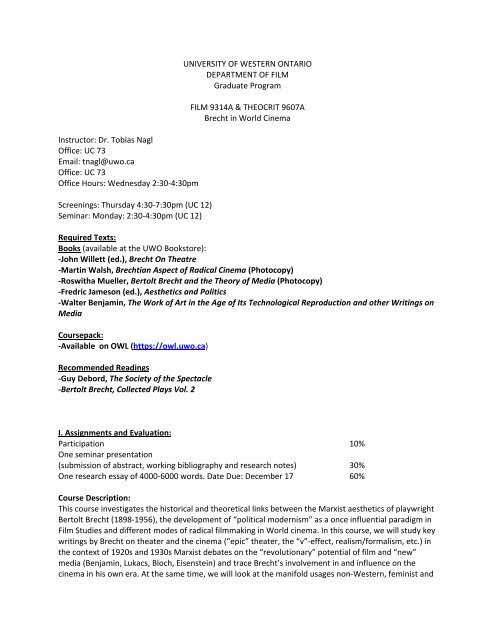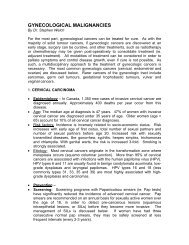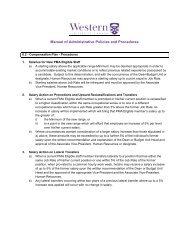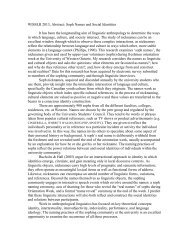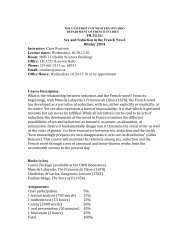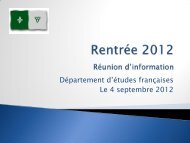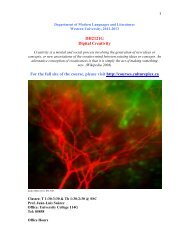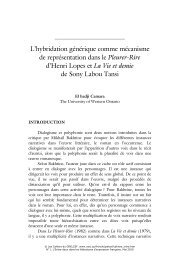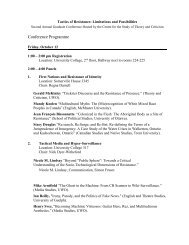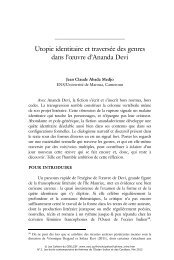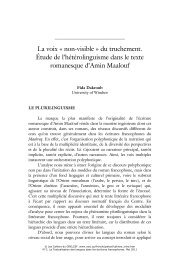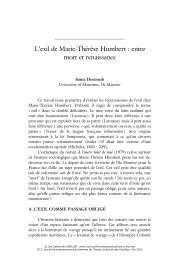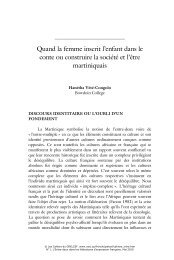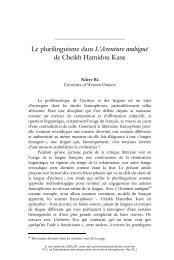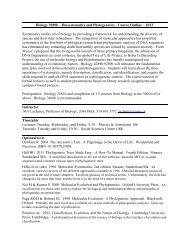Course Syllabus - University of Western Ontario
Course Syllabus - University of Western Ontario
Course Syllabus - University of Western Ontario
Create successful ePaper yourself
Turn your PDF publications into a flip-book with our unique Google optimized e-Paper software.
Instructor: Dr. Tobias Nagl<br />
Office: UC 73<br />
Email: tnagl@uwo.ca<br />
Office: UC 73<br />
Office Hours: Wednesday 2:30‐4:30pm<br />
Screenings: Thursday 4:30‐7:30pm (UC 12)<br />
Seminar: Monday: 2:30‐4:30pm (UC 12)<br />
UNIVERSITY OF WESTERN ONTARIO<br />
DEPARTMENT OF FILM<br />
Graduate Program<br />
FILM 9314A & THEOCRIT 9607A<br />
Brecht in World Cinema<br />
Required Texts:<br />
Books (available at the UWO Bookstore):<br />
‐John Willett (ed.), Brecht On Theatre<br />
‐Martin Walsh, Brechtian Aspect <strong>of</strong> Radical Cinema (Photocopy)<br />
‐Roswitha Mueller, Bertolt Brecht and the Theory <strong>of</strong> Media (Photocopy)<br />
‐Fredric Jameson (ed.), Aesthetics and Politics<br />
‐Walter Benjamin, The Work <strong>of</strong> Art in the Age <strong>of</strong> Its Technological Reproduction and other Writings on<br />
Media<br />
<strong>Course</strong>pack:<br />
‐Available on OWL (https://owl.uwo.ca)<br />
Recommended Readings<br />
‐Guy Debord, The Society <strong>of</strong> the Spectacle<br />
‐Bertolt Brecht, Collected Plays Vol. 2<br />
I. Assignments and Evaluation:<br />
Participation 10%<br />
One seminar presentation<br />
(submission <strong>of</strong> abstract, working bibliography and research notes) 30%<br />
One research essay <strong>of</strong> 4000‐6000 words. Date Due: December 17 60%<br />
<strong>Course</strong> Description:<br />
This course investigates the historical and theoretical links between the Marxist aesthetics <strong>of</strong> playwright<br />
Bertolt Brecht (1898‐1956), the development <strong>of</strong> “political modernism” as a once influential paradigm in<br />
Film Studies and different modes <strong>of</strong> radical filmmaking in World cinema. In this course, we will study key<br />
writings by Brecht on theater and the cinema (“epic” theater, the “v”‐effect, realism/formalism, etc.) in<br />
the context <strong>of</strong> 1920s and 1930s Marxist debates on the “revolutionary” potential <strong>of</strong> film and “new”<br />
media (Benjamin, Lukacs, Bloch, Eisenstein) and trace Brecht’s involvement in and influence on the<br />
cinema in his own era. At the same time, we will look at the manifold usages non‐<strong>Western</strong>, feminist and
left‐wing European filmmakers made <strong>of</strong> Brecht’s aesthetic strategies during the worldwide social<br />
upheavals <strong>of</strong> the 1960s and 1970s in their attempts to politicize film form and spectatorship and develop<br />
popular modes <strong>of</strong> film practice that challenge both the historical avant‐gardes and commercial cinema.<br />
Finally, we will critically analyze the rise and shortcomings <strong>of</strong> theoretical “Brechtianism” in Film Studies<br />
(as an eclectic amalgam <strong>of</strong> Althusser’s theories <strong>of</strong> ideology, Lacan’s re‐reading <strong>of</strong> psychoanalysis, and<br />
Barthes’ semiotics) and explore alternatives to theorize the political potential <strong>of</strong> the moving image after<br />
the “end” <strong>of</strong> cinema. This course is not for the faint‐hearted: some <strong>of</strong> the films screened in this class can<br />
be quite challenging.<br />
II. Information for Students<br />
Absences and Late Assignments<br />
If you are absent from seminar or screening or an assignment is late due to illness or other legitimate<br />
reasons please contact me as soon as possible and forward supporting documentation to your Faculty. If<br />
you are in doubt as to the ‘legitimacy’ <strong>of</strong> your situation regarding lateness or absence please contact me<br />
as soon as possible.<br />
For more information please go to Student Services https://studentservices.uwo.ca/secure/index.cfm<br />
Participation<br />
∙ Participation marks will be awarded for active engagement in seminar discussions, critical<br />
responses to required readings and constructive and insightful comments made on the peer<br />
assessment pr<strong>of</strong>ormas.<br />
∙ Additionally seminar members will be assigned to act as theory discussants on a weekly basis.<br />
This will require the parsing <strong>of</strong> a required theory text that conveys the substantive elements <strong>of</strong><br />
the assigned writer’s argument and <strong>of</strong>fers illustrations <strong>of</strong> said argument with reference to the<br />
film(s) viewed in a given week, and, if pertinent examples from previous weeks. This 10 minute<br />
presentation should provoke further discussion.<br />
Seminar Presentation<br />
A 500‐word abstract <strong>of</strong> your presentation and a working bibliography are due one week before the<br />
seminar you select or earlier.<br />
Please make an appointment to discuss the abstract and bibliography with the instructor a week before<br />
the seminar.<br />
A copy <strong>of</strong> your research notes is to be submitted to the instructor on the day <strong>of</strong> your seminar.<br />
Please make copies <strong>of</strong> the abstract available for your colleagues at least 24 hours before your<br />
presentation. If you use power point for your presentation please submit a copy <strong>of</strong> the file to the<br />
instructor) so that it can be uploaded for your colleagues to consult on Web CT.<br />
Oral presentations are to be 30 minutes, followed by a discussion moderated by the presenters.
Students should select an aspect <strong>of</strong> a given text that intrigues them, and will sustain further<br />
investigation. It is expected that students will integrate some <strong>of</strong> the theoretical readings <strong>of</strong> the week<br />
and/or previous weeks into their presentations.<br />
You might wish to raise questions at the end <strong>of</strong> your presentation to further class discussion.<br />
Speak clearly, and slowly; the pace <strong>of</strong> an oral delivery, and the amount <strong>of</strong> eye contact a speaker has with<br />
an audience <strong>of</strong>ten determine the effectiveness <strong>of</strong> the presentation.<br />
Peer Assessment <strong>of</strong> Seminar Presentations<br />
All students will participate in the assessment <strong>of</strong> seminar presentations by making constructive<br />
comments on the peer assessment pr<strong>of</strong>ormas. Completed pr<strong>of</strong>ormas are to be returned to the<br />
instructor on the day following the seminar. I will remove the names <strong>of</strong> assessors from the pr<strong>of</strong>ormas,<br />
and share class comments with the seminarists.<br />
Plagiarism is a serious <strong>of</strong>fense and is prosecuted to the fullest extent that university regulations permit.<br />
Screenings<br />
Attendance is compulsory. For individual study, videos may be viewed in UC 1.<br />
Please note the schedule below is provisional. If discussion is productive we may carry over a topic from<br />
one week to another.<br />
III. Grading Criteria for Written Assignments<br />
A+ (90+) Work <strong>of</strong> publishable standard, albeit with some revisions possible. Equivalent to advanced<br />
Ph.D. level work.<br />
A (88‐89) Excellent: displaying extensive originality.<br />
A‐ (85‐87) Strong performance at MA level, fully equal to that <strong>of</strong> an average Ph.D. student. Must be<br />
well‐written and show some originality.<br />
B+ (80‐84)Good MA‐level work, indicating the student’s potential (with some reservations) to work<br />
successfully at the Ph.D. level.<br />
B (78‐79) Competent MA work, but does not suggest potential to proceed to Ph.D. level<br />
B‐ Any mark below 78 indicates performance below the level required <strong>of</strong> a graduate student.


